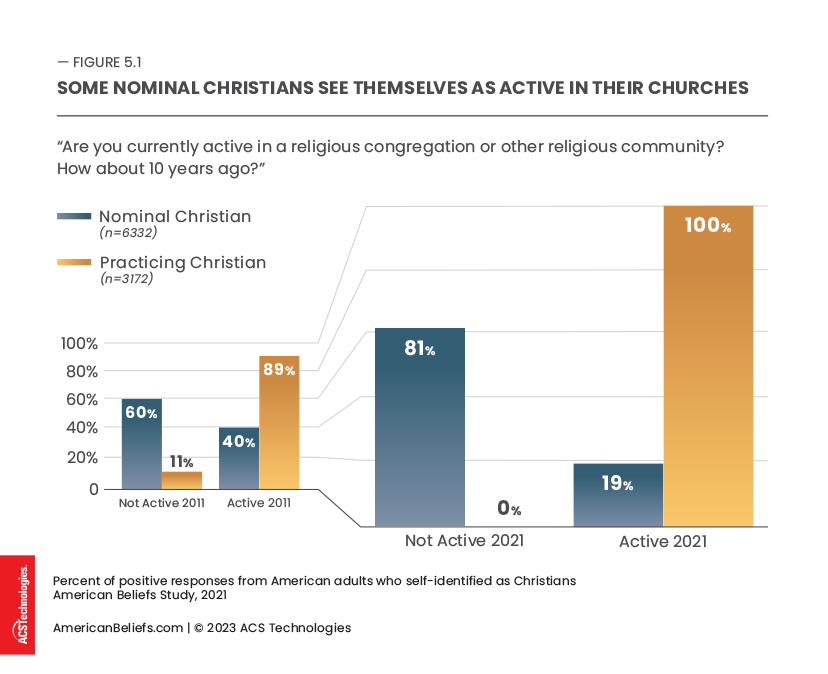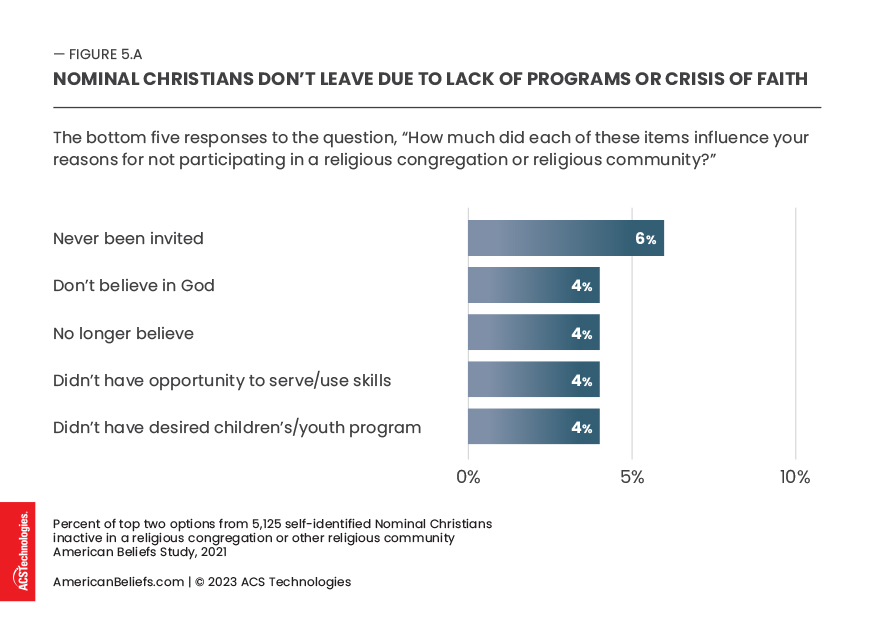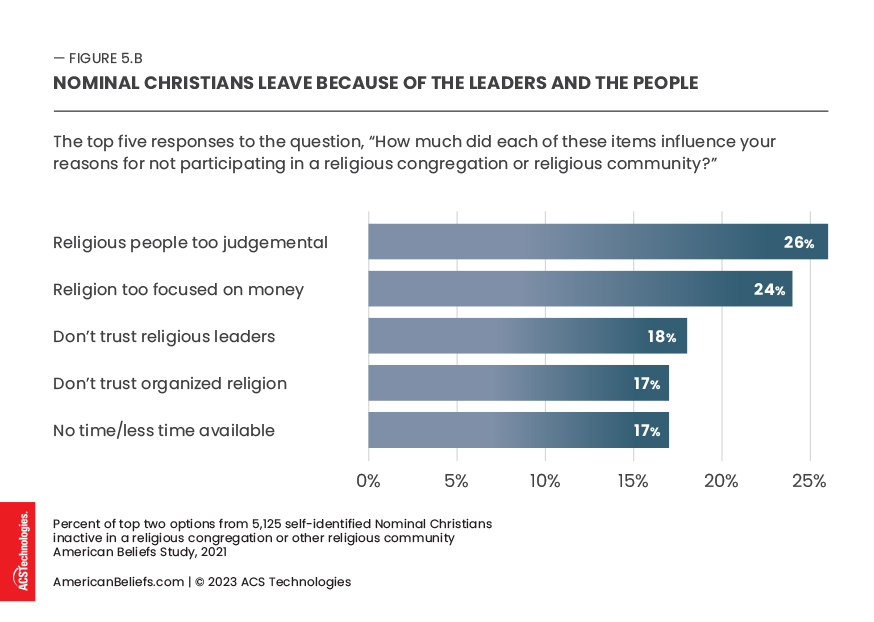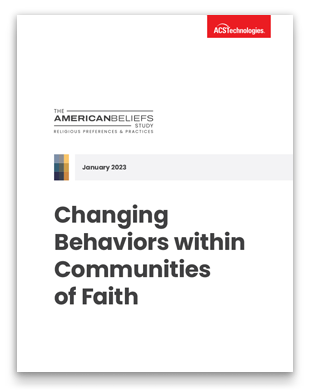The word “nominal” is related to the word “name.” It’s generally thought to mean something like “in name only.” That’s not quite how it works in church-related research. In the American Beliefs Study, many respondents described themselves as “Christian” but admitted they didn’t attend church very often (less than once a month) or considered their faith only moderately important in their lives or less. For the purposes of this study, respondents who met one or both of those criteria were designated as “Nominal.”
These Nominal Christians are different than people who are simply non-religious, the “nones.” Nominal Christians describe themselves as “Christian.” Beyond that, in this Study,19% of them said they were active in their churches or religious congregations. Figure 5.1 below shows that statistic, as compared with Practicing Christians, 100% of whom said they were active.

These data also show that 40% of Nominal Christians said they were active ten years before. So in the span of ten years, 21% of them dropped from being active to being inactive. From other questions, the Study showed that the following items characterized these Nominal Christians who made the shift to become inactive:
- They tended to be young. The age group with the largest shift was those under 30.
- More women than men shifted to inactive status.
- They tended to hold opinions on social issues (like abortion, racial justice, and economic justice) that were slightly more progressive than traditional.
- Even though they were inactive in their churches or religious congregations, they still tended to strongly agree that “Jesus was both divine and human,” that he “rose from the dead as the Bible describes,” that he “rules now and always as Lord of heaven and earth,” and that “he is the only way for human salvation.”
- In response to those beliefs, they tended to say, “I have a personal relationship with Jesus.”
- Despite that, they generally held negative views about church. They were more likely to say that believing in Jesus does not require attending church, and that people in the church don’t behave as Jesus would.
Many Nominal Christians have left the church but not left the faith.
In general, these Nominal Christians still believe in the Christian message, even though they have become inactive in their churches. This presents both an opportunity and a challenge.
- It’s an opportunity because it’s easier to encourage someone who still believes in Christ to return to church, than it is to encourage someone who has quit believing in Christ to return both to faith and to church.
- It’s a challenge because once someone has gotten out of the habit of regular church involvement, it’s difficult to re-establish that pattern.
What is it that leads Nominal Christians to become inactive? What are the factors that keep them at a distance? The American Beliefs Study sheds valuable light on these questions. Nominal Christians who confirmed they were inactive, in another question rated a list of 25 items for how much each of these influenced their decision to become less involved. The following two charts show the items that Nominal Christians ranked lowest, and then the items they ranked highest.
So first, here are factors that didn’t particularly drive Nominal Christians away.

For the most part, Nominal Christians did not quit attending because they no longer believed in God, or no longer believed in the Christian message. This fits with other findings mentioned above. They may have pulled away from participating in church, but for the most part they did not change what they believed about God and spiritual reality.
Generally, Nominal Christians don’t become inactive because of a lack of programs for children or youth. Other findings in this Study support the idea that the presence of special programs like these is not a strong factor in attracting people to church, nor is their lack a strong factor in driving people away.
What about getting people involved in serving? Using their gifts and talents in the work of the church and its ministries? That is a good and important part of healthy congregational life. But it is apparently not a failure on this point that leads Nominal Christians to reduce their participation. Maybe they had a positive attitude toward giving volunteer service and were satisfied with the level of opportunities presented to them, so this was not an issue. Or maybe they had little or no interest in serving. So this topic did not affect their decision one way or the other.
Now to move from the bottom five reasons to the top five. Nominal Christians who were inactive in their churches listed these items, above all, as factors that influenced them toward reducing their participation.

It’s ironic that this set of responses—that seems pretty judgmental—came from a group of survey respondents whose biggest complaint was about judgmentalism. How different might this look if both the departed Nominal Christians and those who remained in church were more accepting, kind, and gracious? At any rate, there is an important lesson here for churches that want to attract inactive Nominal Christians back into the fellowship. Adopt a posture of humility, grace, and love. Check your attitudes. And make sure you’re not looking down on others or thinking of yourselves as better than they are. Demonstrate openness.

One of the most important things churches can do to attract Nominals back to greater involvement is to set an atmosphere of acceptance, as against judgmentalism.
Of these top five issues, four relate to the people, leadership, and church institutions. Nominal Christians are turned off because they see these as too judgmental, too needy, and unworthy of trust. In saying they don’t trust “organized religion,” these Nominal Christians indirectly point to the leadership. Since it’s the religious leaders who set or maintain the organizational system.
None of those four issues are easy to address. Most of us can think of times when we’ve changed our behavior only to find that this had no impact on the opinions of our critics. Maybe we changed, but how they felt about us didn’t. This can be frustrating and disappointing. But that does not mean no effort should be made. After all, it was Jesus who said, “Judge not.” If someone sees a church as judgmental, it’s probably based on something and not completely fabricated.
Then there is the fifth item, “No time/less time available.” We live in a busy society, where people feel stressed about not having enough hours in the day. It’s not something that one church can solve for their community in any broad way. But people make time for what they consider most important, and that’s where this issue can be addressed. It probably doesn’t help to rebuke inactive Christians, “Don’t tell me you have no time for this!” It’s probably more fruitful to find ways to prove to them that specific church events, programs, or activities are worth their time. People get to choose how they spend their time. And they can become convinced that spending time in Christian worship, fellowship, or service is better than spending time in the lesser things they are doing now.
In many cases, changes in behavior will only come if there are changes in values. People who spend time in activities other than church do so because they value those other activities more highly. It may require personal spiritual renewal, or a fresh encounter with the living God, to bring a deep change in values. Churches or religious congregations can consider how to help make that happen.
Key Findings:
- 21% of Nominal Christians who admitted they were inactive in their church or religious congregation also said they were active ten years prior. People shift over time.
- By far most of those who have become inactive still believe in God and the Christian message.
- Nominal Christians generally don’t leave their churches because of a lack of church programs or functions. They generally leave because of issues with the people or the leadership.
- The biggest reason why Nominal Christians said they didn’t participate in church or a religious congregation was because of their perception of judgmentalism. The second biggest reason was their perception of too much focus on money.
Ideas for Your Church:
- Preach and teach about the connection between faith in God and active participation in a church, a community of faith. The Gospels, which are about Jesus, lead directly into the Book of Acts, which is about the Church. In the New Testament there is no expectation that anyone can live the Christian life on their own.
- Don’t assume that people who believe in Jesus Christ will attend church and be involved, simply because of what they believe. People need to become convinced not only of Christian truth, but also that church involvement is worth their time.
- Set an atmosphere of love, acceptance, and open-hearted fellowship. Never forget that we are all sinners. And all on the same level, and only Jesus is in a position to judge.
- Take a fresh look at the attitudes and practices in your church about money. Is giving presented as a joyous part of Christian devotion or as a burdensome obligation? Does fear about lack of money drive fretful, worry-laden appeals?
About this study
This online study among 14,942 American adults was conducted by Campbell Rinker for ACST from October 2020 through February 2021. Results were balanced by US region, 19 ‘Mosaic’ demographic clusters from Experian, and weighted by age to align with known population characteristics. The study carries a maximum margin of error of ±1.97% at the 95% confidence level within any US Census region. A comparative 2017 study involved the same size audience.
FREE REPORT
Provides Actionable Data on American Religious Life
In this report, you’ll discover:
- The activity level of Americans in local religious communities and how it has changed over the past decade.
- The most pressing concerns Americans face today, concerns that will impact how you reach out to your community.
- Good news and bad news about the theological beliefs of Americans and how they view places of worship in their community.
About the Authors
Dirk Rinker is president and CEO of Campbell Rinker, which has been a leading market researcher for nonprofits since the early 1990s. He has designed and implemented research projects for hundreds of ministries, charities, universities, and museums in the U.S. and internationally— – helping clients understand and act on the attitudes, motivations and perceptions of their valuable constituencies.
Michael Jaffarian is a researcher, writer, and consultant to nonprofits. He and his wife were missionaries for 33 years, serving in Singapore, Virginia, Los Angeles, and England. Most of his ministry has been in global mission research. He has studied, and written on, growth trends among tens of thousands of Christian denominations, globally.





